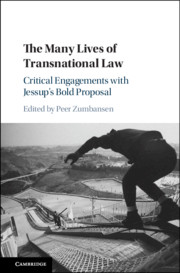‘This volume brings together leading international scholars - from various mainstream as well as critical and interdisciplinary perspectives - to explore the historical and contemporary normative frameworks, public and private actors, and contested power relations in the ever-expanding field of transnational law. Drawing upon the ground-breaking contributions of Philip Jessup in the wake of WWII, the volume points to the innovations of current scholarship that analyze transborder legal processes as collective and discursive practice. Since many aspects of transnational law are largely unregulated by state governments, the volume rightly asks to what degree does transnational law contribute to today's crises of democratic governance? Given what is at stake, the volume is essential reading for scholars and practitioners grappling with the increasing complexities of transnational legal formations in the twenty-first century.'
Eve Darian-Smith - University of California, Irvine
‘From Jessup's first insights on transnational law, itself situated somewhere between the public and private international legal varieties, emerges the riddle of the ‘in-between': inter-legalities, inter-normativities, inter-textualities. Further questions arise: How do we understand law beyond the state, across geographical and disciplinary boundaries, if not as a motley assemblage of claims to legitimacy, soft and hard, crossing and muddling familiar boundaries, aspiring to both global and subnational validity? What exactly is being globalized as law today? What epistemologies are available in order to capture its transformations? This stimulating collection of very diverse ‘multi-dimensional' viewpoints from around the world - by pragmatists, pluralists, feminists, post-colonialists, comparatists, historians … - engages a wide selection of topics, including data flows, arbitration, sports law, environmental regulation, dispute resolution, family, and others - through an equally ample range of conceptual and, indeed, emotional registers - comity, cooperation but also the drama, the unseen, the darker legacy … - to enrich our legal imaginaries.'
Horatia Muir Watt - Ecole de droit, Sciences-po, Paris
‘Jessup magisterially named a phenomenon that promises to saturate the world – the magnetic pull of law towards arrays of problems whose solution extends beyond the state. The seemingly endless proliferation of actual and aspirant legal orders in the transnational demands precisely the relentlessly creative, critical and constructive reflections in this timely volume. It is all here – transnational law as texts and institutions, form and function, drama and symbol, emotion and reason, fact and value, as it confronts food security, global sustainability, terrorism, sport and the family, and much else. No mere jurists' playground, this book presses legal scholars into lively conversation with social scientists who also grapple with law's insatiable reach to problem-solving worldwide. Many Lives is a singular achievement and worthy of searching reflection by scholars and transnational lawmakers alike.'
Terence C. Halliday - American Bar Foundation
‘Transnational Law is more than and different from Public International Law. This idea encompasses a whole world of facts, of instruments and of thoughts. Over the past sixty years, Transnational Law has ventured far beyond the circles of international lawyers as it continues to resonate with efforts in political science, theory and philosophy to conceptualize political order and democratic legitimacy across the nation-state's boundaries. The gift of writings presented here to Jessup and to the legal community at the 60th anniversary of the first publication of ‘Transnational Law' sketches and revisits this history and idea in a truly congenial way – dense, thoughtful, and inspiring.'
Stefan Grundmann - European University Institute, Florence and Humboldt-Universität zu Berlin



